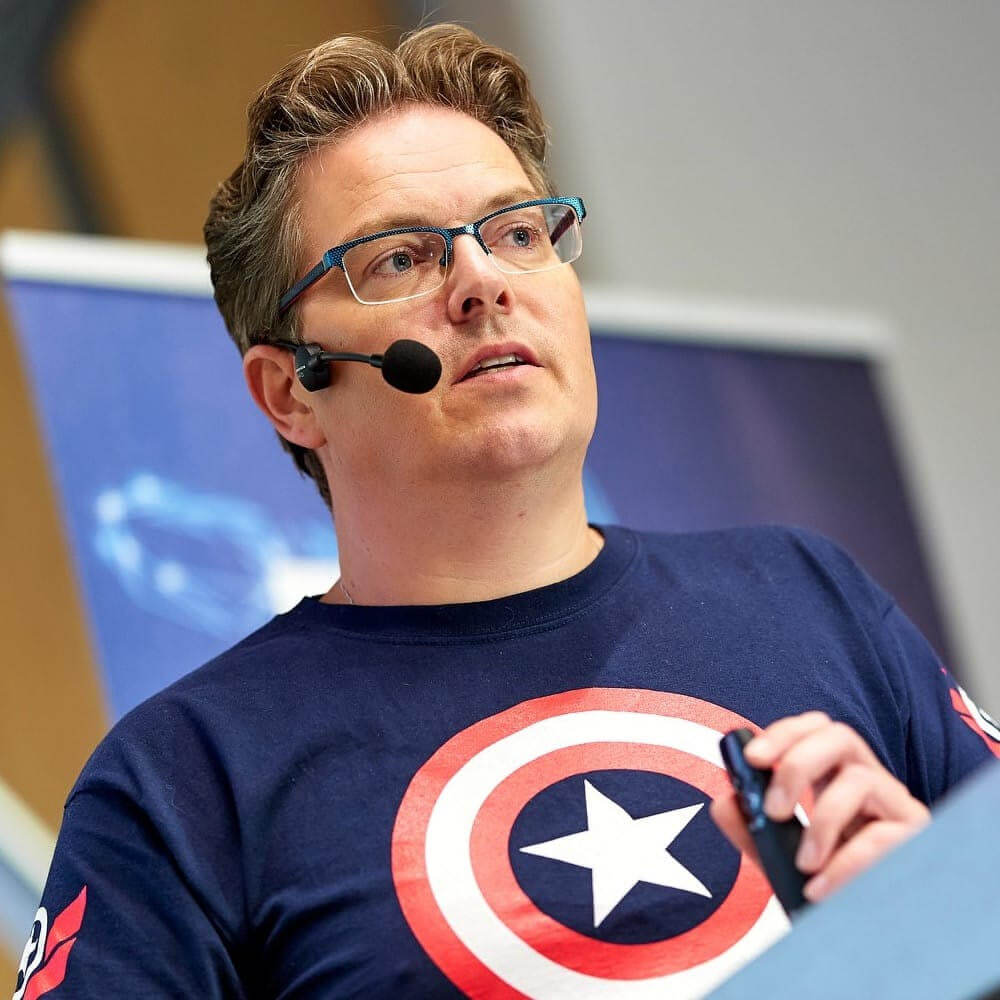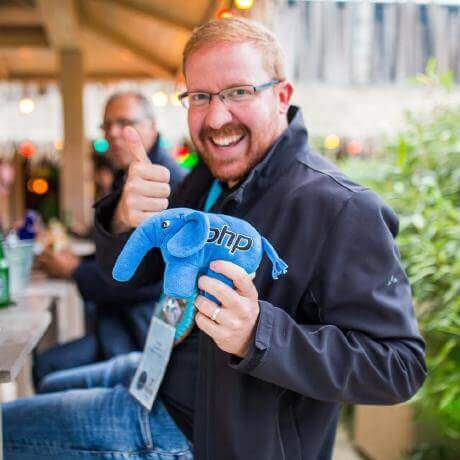Conference speakers
- Home
- Conference
- Conference speakers
Keynote speakers
Gary Hockin

Gary Hockin
Gary Hockin travels all over the world empowering developers as a Developer Evangelist for Twilio (fine purveyors of communication APIs). He is a talented and evocative speaker, a cultivated author of impressively entertaining blog posts, and records elegant and informative screencasts and videos.
When Gary had a real job, he was a developer of at least "competent" standard with over 20 years experience. When not developing, speaking about developing, reading about developing or writing about developing, Gary enjoys playing computer games and arguing with his wife and two kids. Gary has recently discovered that conferences ask speakers to write their own biography text, and you can get away with writing pretty much anything you want.
Things I Wish I Knew When I Started Playing 'Developer'
keynoteI'm a gamer, and some of my favourite articles to read about computer games are those click-bait posts that read "Ten Things I Wish I Knew When I Started Playing Pac-Man!".
When you're playing computer games, it's easy to miss things that are obvious to others, and these posts can help you to understand a simple game mechanic that you'd otherwise have not used.
It got me thinking about the things in my own career that I found out about too late, or didn't fully understand until much later than I needed it.
We'll cover both the technical and the conversational, so join me, as I introduce you to Things I Wish I Knew When I Started Playing "Developer".
Pauline Vos

Pauline Vos
Pauline is a PHP developer currently employed by Werkspot in Amsterdam. She likes good, clean software design and being as efficient (lazy) as possible. Also cocktails, video games and animal memes. She lives in Amsterdam with her cat, Phife Cat, and about three plants.
TO BE UPDATED
Git advanced
sessionYou're a software development consultant called into DevCorp with a mission. What started as a hip, informal startup now has investor demands to meet. And they're counting on you to help them become a scale-up. How do you grow the existing team and maintain the codebase?
This interactive talk, intended for any developer of any level, will give you some valuable technical and soft skills to take with you on your real-life professional journey. Using a voting system, the audience decides... and has to live with the consequences. Based on a mix of personal experience, agile methodology, and software design principles, this story has several possible endings.
Will you help lift your team's performance or run DevCorp into the ground?
Rowdy Rabouw

Rowdy Rabouw
Rowdy Rabouw is a web developer with over 25 years of experience in HTML, CSS, JavaScript and PHP.
Currently, he is a Front-End Focused Senior DevOps Engineer working on Vue.js and Node.js projects with special attention for accessibility.
Rowdy loves watching superhero movies and Formula One races and enjoys riding on his mountain bike to unwind.
PWA Fundamentals: websites with superpowers
sessionThe term Progressive Web Apps was already coined in 2015 and nowadays the browser support for it is excellent, so it's really time to embrace it.
This talk brings you up to speed about the importance and benefits of turning your website or web app into a PWA and gives you practical information on how to do that.
Ever heard of Manifest File, Service Workers, Cache API or Fetch API? We'll walk through these key features one by one.
Liam Wiltshire

Liam Wiltshire
Liam is a UK based developer and the CTO at Tebex, a gCommerce company and game server monetization platform.
From humble beginnings breaking things in Perl, Liam has tackled projects large and small, from brochure sites in WordPress to eCommerce sites in Magento and SaaS products in Laravel.
Outside of CTO-ing, Liam is a father, musician, and is trying to learn the secret to actually having some spare time.
Hack The System: Common ways to attack your platform
sessionSecurity is a common concern at the moment. There are regular stories about companies large and small having their applications hacked, data being leaked, and cards being stolen.
Any application could be targeted, and as developers we are responsible for ensuring that the data our users provide us remains secure.
Thankfully, there are common patterns and vectors that are used, and by knowing the basics of these, you can protect your application from a large number of such attacks.
Join Liam as he demonstrates some of these common vectors, and discusses how you can protect against them.
Florian Engelhardt

Asynchronous PHP
sessionYour script is constantly waiting. For the database, the e-mail server, the HTTP server of any service, a file from the disk or even for the RAM. And with it the customers wait.
I want to show how with an asynchronous architecture, RabbitMQ and ReactPHP the waiting time is significantly shortened and that sometimes you do not have to wait.
Stacy Cashmore

Stacy Cashmore
Stacy is Tech Explorer DevOps at Omniplan, and Microsoft MVP in Developer Technologies.
She’s been developing software since the mid-1990s and has been speaking about improving the way we develop software at conferences and meetups since 2018
As well as sparing with the software architect about technical issues, she spends her time helping the development team, and the wider company, with continuous improvement in terms of technical work, process and, of course, working together as a team.
Outside of work she enjoys spending time with her classic car, cooking, playing the piano badly and spending time with her family, doing amongst other things, building a Lego modular building city in their house.
Embrace the pitfalls (Our stop start journey to Change)
session As developers, we want to work in a modern way, to get fast feedback on what we are building to make sure that we are building the right things in the right way.However, many companies are still at the start of their journey. Things take longer than we would like to get moving, sometimes change can seem to happen at a glacial pace and whilst you are ready to try and run, others are finding their feet - or even digging in their heels!
In this talk, Stacy will go over some of the pitfalls that have happened to her, and the lessons that she has learned from them. Unfortunately, there are no magic solutions to make the problems go away, but hopefully, you can look at the mistakes she has made and go away to make your own new ones to learn from!
Mike Oram

Mike Oram
Mike Oram is the lead trainer at Mayden Academy.
He is a full stack developer with over ten years’ experience working in interface design, front-end and server-side technologies.
Mike most enjoys writing JavaScript and has a particular passion for mentoring and supporting junior developers.
Onboarding junior developers
sessionHiring junior developers is a brilliant way to bulster your team without the high-cost of experienced developers.
Many developers dread hiring and working with junior developers, how do you know if they have the right skills? What should your expectations be?
Once you've found the right person, how do you make sure they are getting the support they need?
Maybe you're terrified of lots of hand-holding, or maybe you're excited because you get to pass on your experience.
Either way, it's in everyone's best interest that they succeed. This talk is perfect for both junior developers joining a new team and developers who work with (or will) junior developers.
Rob Allen

Rob Allen
Rob Allen is a software consultant and developer with many years experience and writes code in PHP, Swift and other interesting languages.
He leads Slim Framework's development team and contributes to Apache OpenWhisk and other open source projects.
Rob is a published author and based in the UK where he runs Nineteen Feet Limited, focussing on API development, training and consultancy.
In his spare time, Rob blogs at akrabat.com and can often be seen with a camera in his hand.
The Making of a Great API
session
Everyone is writing APIs but what makes a great one?
I will take you on a tour of the most important features that you should think about when creating an API.
These ensure that your API plays well with HTTP and make your API a delight to maintain and work with.
Give your API a competitive edge by making it great and developers will want to work with it.
Thomas Shone

Thomas Shone
I've been working with PHP since 2005 and spent 5 of those years working remotely (before COVID).
I lived in South Africa. Now I live in Amsterdan, I have a fondness for databases and security stuff.
On occasion I've been known to point out vulnerabilities in payment gateways.
On occasion I've been threatened with legal action for doing this.
MySQL with🔔&🎵
sessionDive into MySQL to explore our Cargo Culting behaviours and the inner workings of MySQL that explain how the Cargo Culting formed and some useful tricks you may not know about.
- What happens when a table doesn't have a primary key?
- What does a sane primary key look like?
- What is a clustered index?
- How do indexes work?
- How should I design my indexes and how do I know if it is actually being used?
- What tools are there out there to make my life easier?
James Titcumb

Tips for Tackling a Legacy Codebase
sessionYou’ve started a new job. As you dig deeper into the codebase, the WTFs per minute rate rapidly increases, and you’re left wondering... “Where do I start?!”.
In this talk, I’ll draw on my own experiences of joining several different teams to help upgrade their legacy codebase.
I’ll show you what approaches were tried, what worked, what didn’t work, and how things could’ve been done differently
You’ll come out of this talk with some ideas of how to tackle your own codebase and make it easier to refactor.
Neal Brooks

The absolute beginner's guide to Test-Driven Development
sessionAutomated testing; we all know we should do it, but not everybody knows how to do it well. It can be hard to get started with, and getting it wrong actually makes testing harder!
There are so many questions for beginners: - Should you aim for 100% code-coverage? - Should you test getter and setter methods? - Where does a unit test end and an integration test begin? - What is a mock (or a fake, or a spy, or a stub)? - Why bother with unit tests when you can cover everything E2E?
Having worked in several teams spanning the entire spectrum of awful-to-excellent testing, I want to show you some simple steps that will get you up to the realms of 'top-notch' straight away.
In this session we'll take a look at an example application and see how to develop new features which are tested appropriately. We'll introduce new concepts clearly and with examples, and we'll look at how to improve existing tests when an organisation gets it wrong.
No existing testing knowledge will be required to be able to understand this presentation, but you'll leave the room feeling like an expert.
Jessica Rose

Jessica Rose
Jessica Rose is a very sleepy American, based in Birmingham.
She's self taught and passionate about increasing access to technical education and meaningful work in tech for others.
She's currently working on a completely free, large scale programming bootcamp based on freeCodeCamp's curricilum and MOOC principles.
She's a developer relations consultant in her day job. She's always excited to talk to you about the cool and weird things you're excited about now.
Practical Tech Ethics or How to feel a little bit bad about everything for less money
keynote
If you're joining us live, in 2021, you may have noticed that the world around us isn't great right now.
Many of the bad things in the world today are linked to or facilitated by technology. As developers we have a great and terrible responsibility in these bleak times, we could work to make tech and the world better... or, we could at least refuse to make things worse?
In this talk, we'll look at how to define our own personal ethical values and set our own boundaries around these.
By setting our ethical boundaries in advance we can be better prepared to make decisions that reflect our own ethics when confronted by opportunities or challenges.